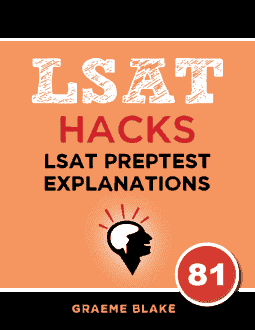QUESTION TEXT: Human skin gives off an array of gaseous substances…
QUESTION TYPE: Necessary Assumption
CONCLUSION: There must be some other gas that human arms give off which attract mosquitos.
REASONING: Humans arms give off carbon dioxide and lactic acid, which attract mosquitos. However, both of these, alone or combined, do not attract mosquitos as much as human arms do. Even in darkness.
ANALYSIS: The author is really close to a good argument. They could have concluded “there must be some other factor in arms that attracts mosquitos”.
But, the author instead gets more specific and concludes “there must be some other gas”. This is unwarranted. The author is assuming there can be no factor other than gas which attracts mosquitos. The right answer mentions one of those other factors, which we must rule out.
Several of the wrong answers can be eliminated because the negations have no impact. Before you consider concept a statement talks about, you need to consider the impact.
For example, consider the statement “nobody dislikes you”. That’s incredible! You’re extremely popular. Now let’s negate it, as weakly as we can: “One person dislikes you”. That’s….still incredible! You’re extremely popular.
As the negation makes no practical difference to your life, it can’t conceivably affect an argument, unless that argument is ruined by literally a single person disliking you. So, before you think about “what’s the effect of dislike?”, ask first what the impact of the negation is. You may not even need to consider effect, and this lets you dodge many traps.
___________
- The stimulus does say “mosquitos”, plural, but it only says that to refer to mosquitos in general. It’s not information about groups of mosquitos. Presumably, even a single mosquito in isolation will be attracted to a human arm. This answer is irrelevant.
If you picked this because you thought mosquitos would communicate with each other about finding arms….that’s really stretching things. Your job is to prove answers wrong, not help them be right. 80% of answers are wrong.
Negation: Mosquitos do communicate with each other. - CORRECT. If this isn’t true, then heat explains why mosquitos are attracted to humans arms, but not to carbon dioxide and lactic acid in a lab.
Negation: Mosquitos are attracted to humans by body heat. - “Greater” is a vague word. It could mean 0.000000001% greater. In which case, it has no effect. A negation needs to be impactful even at its weakest version. In this case, moving from 0.000000001% greater to “the same” has no impact.
Darkness (night) was only mentioned to show mosquitos weren’t finding arms using vision.
Negation: Human skin gives off gaseous substances in equal amounts during the day and during the night. - Darkness isn’t really relevant to the argument. It was only mentioned to show that mosquitos don’t use vision to find human arms. Also, you need to negate as slightly as you can. A 0.01% difference makes no difference.
Negation: Mosquitos are 0.01% more successful at finding human arms in darkness. - “Never” and “any” are hints that this is a very weak statement when negated. You always have to negate in the weakest way possible, and the opposite of “never” is “practically never”. Which isn’t impactful. Also, the negation goes in the direction of making the argument stronger. If human arms produce mosquito repellent, but mosquitos are still attracted to human arms, then there must be some other factor in arms that attracts mosquitos.
Negation: Human skin will very rarely give off a single substance that mildly repels mosquitos.


Leave a Reply